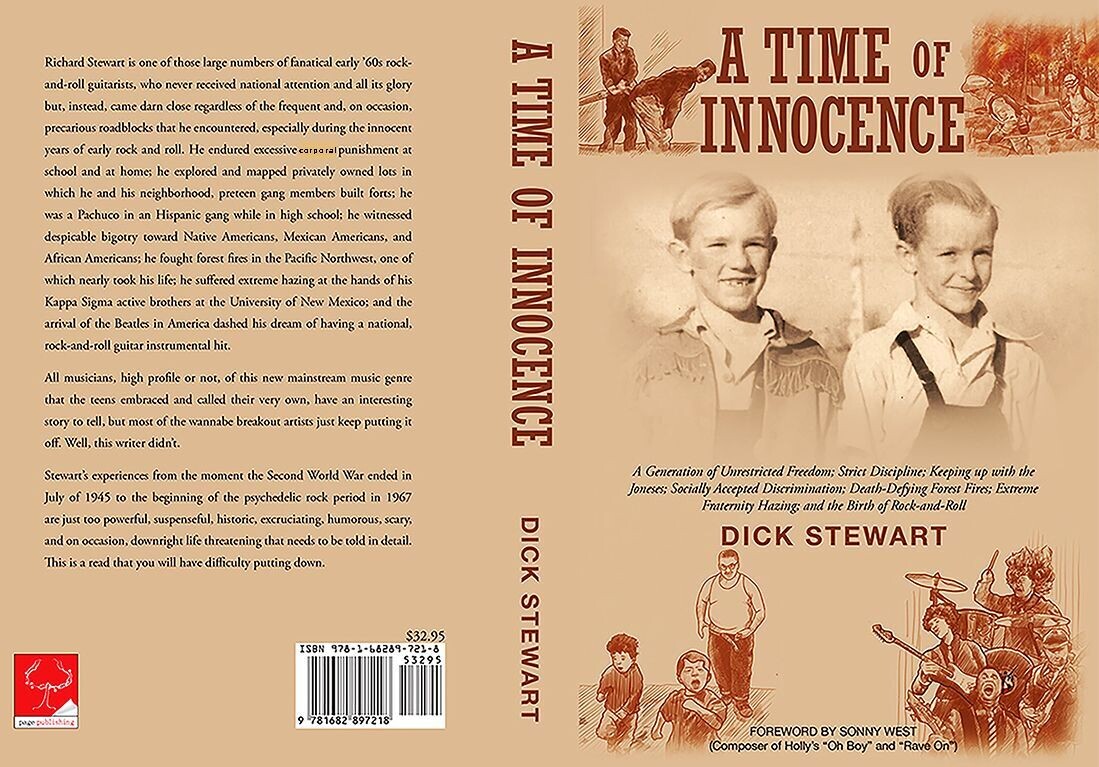TOTAL CREDITS FOR LANCE RECORDS
(Including King Richard and the Knights and Ritchie and Jason Stewart)
(Rock and Roll during) A Time of Innocence
This book is an historic account of the birth of rock and roll and its early development during a time of innocence in Albuquerque, New Mexico from 1940 (the year this author was born) through 1968 when rock and roll began to lose its innocence and what led up to it. And although 1954 is considered by many historians to be the genre’s official year of birth, my life experiences from 1940 up to the emergence of rock and roll are presented to show what it was like growing up in an environment of simplicity before the electronic age; how my neighborhood buddies and I counterbalanced it by creating our own history as a means of entertainment; and how our innocent lifestyle helped contribute to the city’s birth and early evolution of a style of music that the teens instantly called their own.
But it wasn’t always a picnic. Severe corporal punishment was in and our parents and school teachers wasted no time in dishing it out when we got out of line. And because New Mexico is a tricultural state; that is, Native American, Hispanic, and Anglo, socially accepted discrimination was an accepted practice that also included Albuquerque’s small population of African Americans.
I was called a number of names during my Valley High School days in the 1950s, beginning with Dickie (which I hated), Richard (which I employ in this book to avoid confusion as it’s written in third person), Dick, Stewart, Ritch, Ritchie, Ricardo, cabron or pinche (which were yelled at me by my Pachuco compadres when pissed), and el Chuco Blanco, ese (guy), blonde, guero (whitie), and carnal (which were used by my Pachuco compadres when pleased).
When rock and roll was born, the teens welcomed it with open arms, but then began losing respect for the adults because they ridiculed it, sometimes on television, calling it jungle music with sexually suggestive words. And even though the anti-establishment movement was in full bloom by the early 1970s, the adults’ immediate dislike of rock and roll was, in fact, the first hint of the movement’s birth as well.
I loved classical music and progressive jazz at an early age, but was instantly spellbound when rock and roll made the scene in Albuquerque (A.K.A. the Duke City) in 1954. I was fourteen and blown away with Chuck Berry’s pioneering guitar-riff contributions and the emerging doo-wop artists such as Fats Domino and Little Richard, followed a few years later by white artists, Elvis Presley, Buddy Holly and the Crickets and Ritchie Valens. However, it was Raton, New Mexico’s Fireballs of “Bulldog” guitar-instrumental fame and the Venture’s 1960 worldwide instrumental hit, “Walk Don’t Run” that encouraged me to pick up the electric guitar and write as well as perform instrumentals. But it couldn’t be any brand of guitar. It had to be a Fender, specifically the Jazzmaster because of its unique sound. To me, no other guitar could match its beautiful melodic tone.
My early innocent life experiences also included pledging the Kappa Sigma fraternity at the University of New Mexico in 1958 and enduring a semester of bitch-court paddling, a week of extreme hazing, and maintaining at least a ‘C’ average while sweatin’ the military draft in order to become a permanent active. Tuition costs for a full load of classes were very low by today’s monetary standards, and Federal student loans didn’t exist, and my parents couldn’t afford to pay my tuition. So I took care of my approximate $89 tuition fee as a full-time student by working for the US Forest Service in Idaho during the summer months alongside other college students from all parts of the United States, protecting the forests against mostly lightning-caused wildfires, some of which were life-threatening.
But, my life changed in 1961, when I founded the first, full-time rock-and-roll instrumental band, the Knights (later, King Richard and the Knights when vocals were added, and because nearly all the major cities in the US had a band called the Knights). In 1964, I wrote and released an instrumental titled “Precision” that hit locally and it, along with the Beatles’ arrival to America in 1964, contributed to an explosion of Albuquerque garage bands and record labels. Many of the Duke City musicians in these bands became important local pioneers of rock and roll during the genre’s early stages of development and are spotlighted in detail with descriptive text as well as rare promotional flyers and photographs of the time.
In the mid-‘60s, I lessoned my interest in promoting the Knights and shifted my focus on other New Mexico bands both in the rock genre and those that specialized in rhythm and blues by means of The Lance Newsletter , Albuquerque’s only monthly publication that reported on music the teens liked at the time. During its publication, I formed Lance Records, which, to date, has become the largest rock-and-roll record label in New Mexico as well as one of the most collectable of indie record labels in the world.
Thankfully, the writings of my childhood booklet and mid-‘60s publications of the Lance Newsletter issues made it possible to write this book, because they are the only known historic printings of the history of my early upbringing in Albuquerque’s Northwest Valley and my full-time involvement in the Duke City’s early rock-and-roll music period, which likely mirrors the innocent lifestyles of the aspiring rock-and-roll artists and musicians during the genre’s early development throughout America.
Dick Stewart
50s Rockabilly,
'60s Garage Band Music, Surf and Modern Guitar Instrumentals.
- Have a question about RV Stewart Productions?
Can you tell me more about RV Stewart Productions?
Welcome to RvStewartProductions, home of Record collectibles, the Lance Monthly, Cool Links Publishing, and Lance Music Publishing. Lance Record's focus is on early rock and roll from its official birth in 1954 throughout the ‘60s with a special emphasis on early ‘60s guitar-rock instrumental styles by King Richard and the Knights and modern guitar-rock offerings by Ritch Stewart, his brother, the late Jason Stewart who sadly passed on April 15, 2021, and their father, Dick Stewart. RvStewartProductions (Record collectibles) is not a new company.
The spark for Record collectibles came when Albuquerque-native, Dick Stewart was bitten by the rock-and-roll bug in 1954 and wanted to do more than just listen and dance to its infectious beaHe wanted to be a contributor.
Guitar-rock instrumentals became his passion after listening to the late ‘50s and early ‘60s hits by George Tomsco and the Fireballs from Raton, New Mexico, and the Ventures from the Pacific Northwest. As a result, in 1961, Stewart formed the Knights that later became known as King Richard and the Knights. A few years later, Stewart composed and released a guitar instrumental titled “Precision” with his band, and it earned a number-one spot on KQEO, the leading rock-and-roll, top-40 A.M. radio station in New Mexico at the time.
L.A.’s Dot Records was so impressed with the instrumental’s classical piano hook that the major record label made an offer to release it nationally but sadly changed its mind when the Beatles came to the United States. Not only the Knights, but many aspiring rock-and-roll bands suffered the same fate. It was the coming of the British Invasion and the 45-vinyl record-buying teens turned their undivided attention toward the Beatles, including a slew of newly formed British bands that immediately followed. But Stewart didn’t throw in the towel. In 1965, he published the Lance Newsletter (today the Lance Monthly) in Albuquerque to help put some of the local bands, including his own, on the map. It was during this time that Stewart formed Record collectibles which immediately signed many of these local bands which showed promise. In the late ‘60s, Stewart turned his attention toward another genre of music: Mexican/America Rancheras and formed Casanova Records. He released several vinyl record albums and singles by the popular New Mexico Mexican/American bands, and he and the Knights contributed four of their own instrumental offerings.
One of them was their version of “El Rancho Grande” which became an instant hit in the Mexican/American market of the Southwest and continues to this day to do well with downloads and listens on the Internet. RvStewartProductions (Record collectibles) is very active today. Record collectibles continues to release CD albums, most of them instrumental with King Richard and the Knights with Dick Stewart and Ritch Stewart at the helm. Dick Stewart has also been busy writing books on the history of early rock and roll, his latest being Fourteen Unsung Pioneers Who Didn’t Get Their Due. In addition, the Lance Monthly will once again post new issues. There’s a lot to see and much to take in at Record collectibles. So, take your time while enjoying the rest of the recently released King Richard and the Knights’ instrumental, “Phantom Riders.” When you give Record collectibles a call, you will be directly connected, so don't wait, call now!
How can I get in contact with someone from RV Stewart Productions (Record collectibles)?
You can get in touch with Record collectibles through three methods:
Phone for Record collectibles: 505-286-0623
Email for Record collectibles: rvstewartproductions@yahoo.com
Contact form: Use the contact form on our website to get in touch with Record collectibles.
Who were The Knights?
The Knights (a.k.a. King Richard and the Knights) had its beginnings in 1961 in Albuquerque, New Mexico (U.S.A.), during a time when instrumental rock ruled the world with The Ventures and The Fireballs leading the way. Thus, the band (or combo as it was called back then) became a Ventures/Fireballs-style band, playing 40 to 50 instrumental guitar songs per gig with no vocals other than a Chuck Berry tune here and there to break the monotony. By 1964, the band finally developed an identity and released "Precision" on a little label called Red Feather Records. This guitar instrumental with a classical piano accompaniment performed by the studio engineer, Dave Bonham, became a regional hit (chiefly due to the unique combination of these two music genres) and set the record for the most time at number one for a local release on the then ruling Albuquerque, New Mexico rock-and-roll AM radio station, KQEO. But when the Beatles invaded the U.S. in Feb. of 1964, it was a bad omen for The Knights. The Knights just couldn't give up their beloved rock instrumental efforts. After a few notable vocals on John Wagner Studios' Delta Records, the band disbanded in 1967.
When you give Record collectibles a call, you will be directly connected from someone from Record collectibles, so don't wait- call now!

